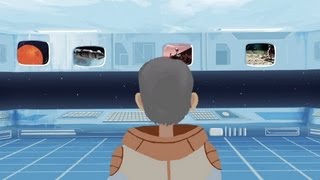(单词翻译:单击)
Some of the issues that are important if you want to have people in space for long periods of time.
如果人类想长期置身太空,有几个重要的问题(不得不考虑)。
One is that people will tend to lose bone and muscle mass. We know this.
其中之一就是骨质疏松与肌肉萎缩。我们都知道。
If you have to put a cast on your leg, and you take the cast off after a few weeks,
如果在你的腿上打上石膏,几周之后取下石膏,
you'll see that your muscles have shrunk in size.
你会看到你的肌肉体积萎缩了。
And if you measured the bone strength, you'd also see that might have gone down a little bit, too.
并且如果你测量骨骼的强度,也将看到些许下降。
And so, it's very interesting that our body has that ability to adapt to the loads that are put on it,
而且,我们的身体可以适应加在之其上的负重,这是相当有意思的,
so that bones and muscles aren't static, they're always changing.
所以我们的骨骼和肌肉不是永恒不变的,它们在不停发生变化。
While we think of bone as being a solid thing that doesn't change very much, it changes too.
即使我们认为很牢靠的骨骼并不怎么变化,但其实它也会变化。
And it turns out that in weightlessness, you lose bone.
事实上,在失重状态下,骨质会发生流失。
And then you also cause the muscles that work against gravity, what are called the postural muscles,
并且我们称之为“姿势肌”的用以对抗重力的肌肉,
they'll start to shrink and lose strength.
也会开始萎缩并失去力量。
There are other things in the cardiovascular system, the heart and blood vessels.
再来看看心血管系统:心脏及血管。
And if you think about it, standing up in gravity means you have to work against gravity in order to keep blood pumping to your head.
你想象一下,你在重力环境下站起来,必须对抗重力以保证血液流向头脑。
So, if you couldn't keep blood pumping in the head,
所以,当你不能保证血液流向头脑,
you'd pass out every time you stood up because when you're lying down, you don't have to push against gravity.
你每次躺下后起身会会感到头晕,这是因为当你躺下来的时候不需要对抗重力。
But when you stand up, you got to work against gravity to keep blood flowing to your head.
但是当你站起来的时候你必须再次对抗重力,以保障血液流向你的头脑。
And your heart and blood vessels have a really nicely worked-out system to make that happen every time.
每当上述情况发生,你的心脏和血管有一套自发的应付机制。
But that system can also change in weightlessness.
但是在失重条件下这套机制也会变化。
And then the other area that changes is the system that has to do with balance.
另一个也会发生变化的地方就是平衡系统。
Again, maintaining your balance is something that you're doing against gravity, right?
同样的,保持平衡是在重力环境下做的事情,对吧?
If you didn't have gravity present, you wouldn't have to worry about falling.
如果没有重力存在,我们也不用担心跌倒了。
But you obviously do have to worry about falling,
但是很明显,你需要担心跌倒,
and we have a very highly developed sense of balance to keep us upright and to prevent us from falling.
并且我们已经有相当发达的平衡感知,来使得我们保持直立并防止跌倒。
And when you see what skaters do, you realize just how exquisite a system it is.
而且等你看过别人玩滑板之后,你就会意识到这个系统有多么精妙了。
But when you go into weightlessness, your balance system changes.
但是当进入失重环境时,你的平衡系统跟着变化。

You don't really notice it while you are in weightlessness, but when you come back,
在失重状态下你可能无法意识到这一点,但当你回到正常状态,
you do notice it, that your balance has changed and you have a little bit of trouble maintaining your balance.
你就会注意到你的平衡能力已经发生改变。这时候想保持平衡会有点困难了。
And what it shows is that while you're in space, your brain is trying to allow you to function in weightlessness.
当你置身太空,大脑会设法让你在失重环境下活动。
And so, it re-adapts you to be weightless, which you don't notice until you come back
这样,你再次适应了失重环境,在你回到正常状态之前不会意识到这些的,
and find out that you're now back on Earth with a balance system that's been adapted to space.
落地之后你会发现你的平衡系统已经适应了太空环境。
You know, all life developed here on Earth with gravity being present,
你知道,地球上的生物在重力环境下生存,
so life evolved under the influence of gravity, and then we grow up with gravity being present,
在重力影响下进化,在重力的前提下成长,
so we learn how to walk and catch a ball and ice skate or whatever, all with gravity being present.
所以我们学会如何走路,如何接球,以及溜冰等等等等,这都与重力的存在息息相关。
And what if you were to grow up without gravity?
那么如果你不是在重力环境下长大的呢?
What about the systems that depend on gravity, like your muscles or your balance system or the heart and blood vessels?
那些依赖重力的身体系统会怎么样呢,比如说你的肌肉或者你的平衡系统,或者心血管系统。
Would they develop normally, or would they be different in some way?
它们会正常发展吗,或者会有所不同吗?
One reason why you might think that it would go down a different pathway
你可能觉得事情会朝另一个方向发展,
is from an experiment that was done some time ago by two neuroscientists called Hubel and Wiesel.
不久以前,两个叫做休博尔和维瑟尔的神经学家所做的实验替你给出了理由。
And what they did is they had a kitten, and they put a patch over the eye of the kitten.
他们有一只小猫,他们给小猫的一只眼睛戴上眼罩。
And then the kitten grew up to be a cat, and they removed the patch.
小猫长大后,他们为其取下眼罩。
And so, the question is, can the cat see out of that eye?
那么,问题是它能用那只眼睛看到东西么?
Now, there's nothing wrong with the eye, right?
现在,眼睛本身没有任何问题,对吧?
But it just hasn't seen anything, there hasn't been any light coming in.
但是猫看不到任何东西,这只眼睛感知不见任何光线。
And the answer is that the cat can't see out of that eye
答案是,猫不能从那只眼睛看到任何东西,
because what happens is that the brain goes down a different pathway when it develops
因为它在大脑发育的上出了岔子,
and the connections that would ordinarily develop to that eye don't develop.
本应该发育的与那只眼睛的连接物没有发育。
And that can't be undone, that's a permanent change.
而且这是不可逆的,这是一个永久的改变。
So, the brain of that cat is fundamentally different from the brain of a cat that grew up seeing out of that eye.
所以,这只猫的大脑与通过那只眼睛视物长大的猫的大脑根本上是不一样的。
That cat grew up with a different brain, in essence.
本质上,那只猫长出了一个不一样的大脑。
So, then you wonder, well, what about gravity?
然后,你会奇怪,好吧,那么重力呢?
What if you don't have the forces that gravity produces?
如果失去重力的影响会怎么样?
Is your balance organ going to develop in the same way, or will it be different?
你的平衡系统将会以同样的方式来发育,还是按另一种方式发育?
If somebody grew up in space, could they come back to Earth and function, or would they really be a different person?
如果有人在太空中长大,他们能回到地球上并且功能健全吗,又或者他们实际上会变成一个不一样的人?


